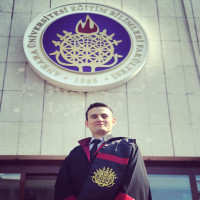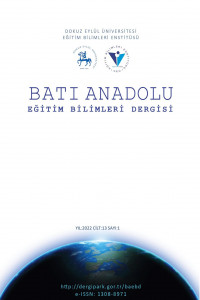Research Article
Aim & Scope
"The WESTERN ANATOLIA JOURNAL of EDUCATIONAL SCIENCES" managed by Dokuz Eylul University, Institute of Educational Sciences is an academic, open access scientific journal published in Turkish or English language twice a year in June and December.
The WAJES publishes qualified studies evaluating practical or theoretical studies in the field of educational sciences with strong research designs. For this reason, it is aimed to publish experimental, correlational or theoretical studies that follow the current educational needs and produce solutions, especially those related to the past and present. In this way, it is expected to contribute to improve educational practices in the elementary, secondary, high school, higher education and lifelong learning stages.
WAJES accepts studies in the fields of education technology, teacher training, field education, guidance and psychological counseling, nature education, etc. The target audience is educators, students, teachers, and individuals and organizations that provide education and education services in the field of educational sciences.
Author Guidelines
In order to send an article to BAEBD you need to form your article according to the template below.
BAEBD article template
Important note: 1. For all research articles that will be sent to BAEBD, ethics commission acceptance must be taken and it must be attached to the article application.
2. On the condition of article acceptance please fill and upload the BAEBD author’s copyright form into the system.
BAEBD Author’s Copyright Transfer Form
Ethical Principles and Publication Policy
Publication Ethics
WAJES has adopted the publication ethics and the rules below since 10.11.2017
1) The journal publishing is based on the obligations determined by the COPE-Code of Conduct for Journal Editors. Detailed information is provided below.
2) WAJES requests plagiarism report from the authors of the articles sent to the journal. Field editor and referee appointment are done to journals whose plagiarism report have been analysed and approved.
3) (Updated on 10.07.2019) WAJES, as from Volume 10. Issue 2 (December 2019) the article proposals which contain data collection such as survey, interview etc. Ethic committee approval will be required from the author before the application. Information related to Ethics Committee document will be presented in method part of the article.
CODE OF CONDUCT FOR JOURNAL EDITORS (COPE)
Responsibilities of the Editors
1. Objectivity and Publisher Freedom. The editors evaluate the submitted article proposals in accordance with the scope of the journal and the importance and originality of their work. Editors do not take into account the racial, gender, sexual orientation, ethnicity, nationality or political views of the authors who submitted the article proposal. Other institutions, other than the journal editor board, cannot influence the decision to correct or publish.
2. Confidentiality. Editors do not share information about an article with anyone other than the responsible author, referees and editorial board.
3. Disclosure and Disagreements. Editors and editorial board members do not use information that has not been published in a submitted article, for their own research purposes without the written permission of the authors.
4. Agreement of publishing. Editors ensure that all articles accepted for publication are reviewed by at least two reviewers who are experts in their fields. The editors are responsible for making decisions based on the articles submitted to the journal, the validity of the study in question, the importance of the researchers and readers, the comments of the referees and such legal conditions.
5. Ethical Concerns. Editors will take measures when ethical concerns arise regarding a submitted article or published article. Any unethical publishing behaviours reported will be examined, even if they occur years after publication. Editors follow COPE Flowcharts in case of ethical concerns. If ethical problems are important, correction, withdrawal can be applied or concerns about the subject can be published in the journal.
Responsibilities of the Editors
1. Contribution to the Editorial Decisions: Editor helps other editors in their editor decisions and helps authors to improve their articles through editorial communication.
2. Speed: Any referee who does not feel qualified to review the article proposal or who knows that the article review cannot be done on time should immediately inform the editors and reject the review invitation, thereby new referee appointment must be ensured.
3. Confidentiality: All article manuscripts are secret documents and they must be handled in this way. Unless authorized by the editor, they shouldn’t be shown to others or they shouldn’t be discussed with others. This is valid for the referees who have refused to review the article.
4. Objectivity Standards: Comments on the article proposal should be made objectively and suggestions should be made in a way that the authors can use to improve the article. Personal criticism of the authors is not appropriate.
5. Acceptance of Resources: Referees should identify relevant published works that have not been quoted by the authors. The referee should also notify the editor of any significant similarity of the article under review to any other article (published or unpublished).
6. Conflicts of interest: Conflicts of interest should be reported to the editor.
Author’s Responsibilities
1. Reporting Standards: The authors of the original research should ensure that the work and results are presented correctly and then the importance of the work is discussed objectively. The article proposal should contain sufficient details and references.
2. Data Access and Storage: Authors must keep the raw data of their work. If necessary, they should submit it for editorial review if requested by the journal.
3. Originality and Plagiarism: Authors should submit original works entirely, and if they have used the works or words of others, this should be properly quoted. Besides, it is important that the citations made by the authors' own thesis and article studies are similar in a minimum level, in other words, the citation is done properly.
Plagiarism from someone else or self in all its forms creates unethical publishing behavior, which is unacceptable. For this reason, a similarity report is requested from all authors who submit articles to the journal. The rate in the similarity report will be decisive in the evaluation process of the article. The articles whose similarity rate is high will be returned and the author will be asked for necessary corrections. In this context, besides the plagiarism made by the work of others, the authors should make an arrangement considering the plagiarism made by their own thesis or articles.
4. Multiple, duplicate, redundant, or simultaneous submission / publication: Authors should not submit an article previously published in another journal for consideration. Simultaneous submission of an article to multiple journals is unethical publishing behaviour and is unacceptable.
5. Authorship of the Article: Only those who meet the criteria of authorship should be listed as authors in the content of the article. These authorship criteria are as follows; (i) contributed to the stages of design, implementation, data collection or analysis; (ii) prepared the text, or made significant intellectual contribution or critically revised it; or (iii) read the final version of the article, approved it and agreed to submit it for publication. The responsible author should ensure that all authors (according to the definition above) are included in the list of authors and declare that the authors have seen the final version of the article and agreed to submit it for publication.
6. Declaration and Conflicts of Interest: Authors should reveal conflicts of interest as early as possible (usually by submitting a statement form during article submission and including a statement in the article). All sources of financial support must be declared for the study (including grant number or other reference number, if any).
7. Referee’s review: The authors are responsible for participating in the review process and are fully liable to respond promptly to editors' raw data requests, descriptions and evidence of ethical approval and copyright permissions. In the event that a "necessary revision" decision is made first, the authors should review and re-submit their articles until the deadline given systematically to the comments of the referees.
8. Basic Mistakes in the Published Works: When the authors find significant errors or inaccuracies in their published works, the authors are obliged to inform the editors or publishers immediately and to cooperate with them to correct them in the form of an erratum on paper or to remove the paper. If the editors or publisher find out from a third party that a published work contains an important error or inaccuracy, the author should take the obligation to promptly correct or withdraw the article or to provide the editors of the journal with evidence of the correctness of the paper.
Price Policy
Batı Anadolu Eğitim Bilimleri Dergisi makale başvurusu, değerlendirmesi ve yayımı için hiçbir ücret almamaktadır.
Indexes
Journal Boards
Owner

Editor in Chief
Editorial Board Members
Advisory Board

Editors










